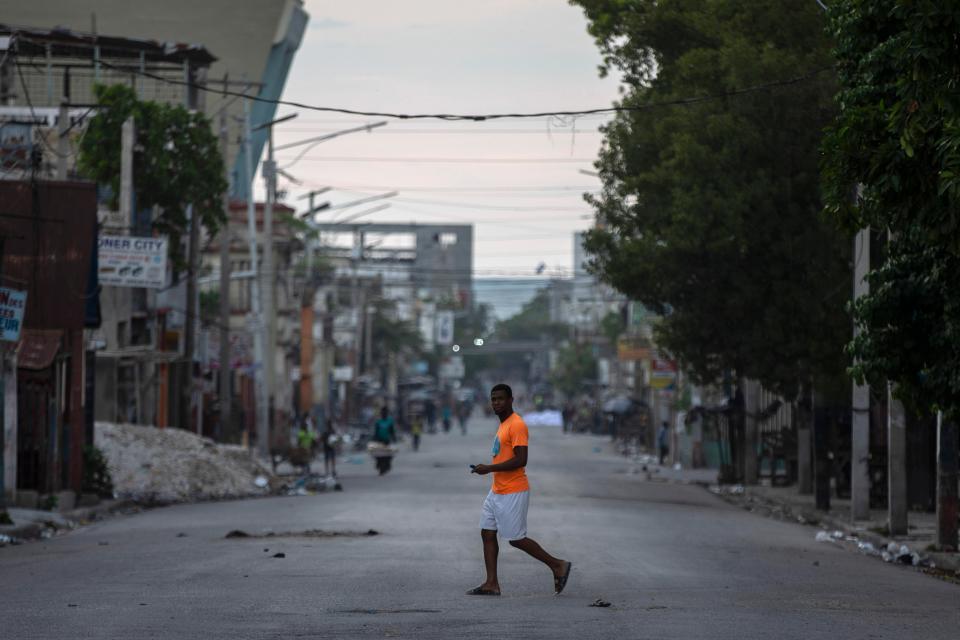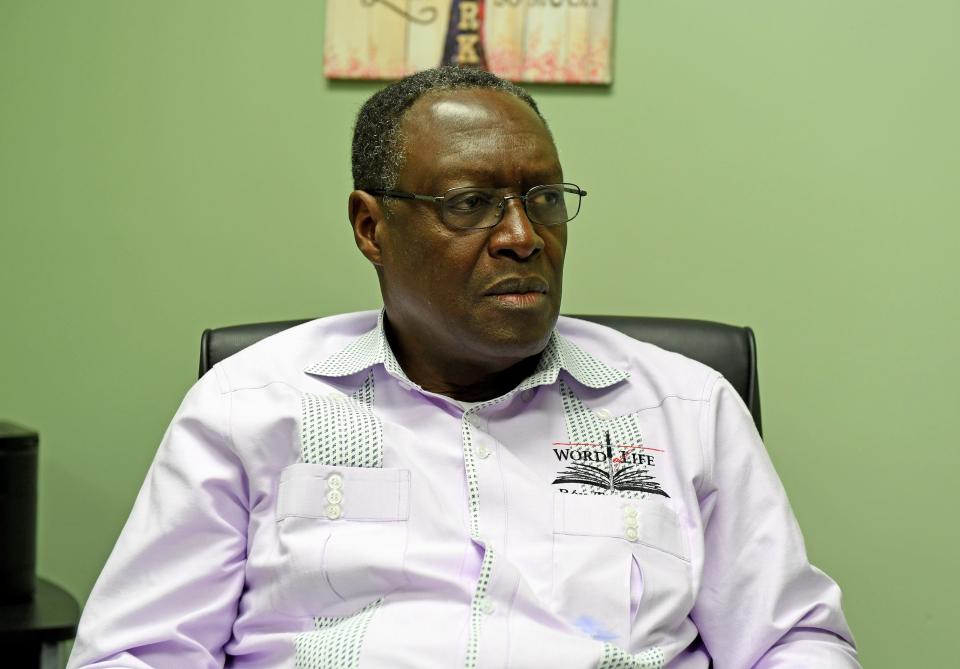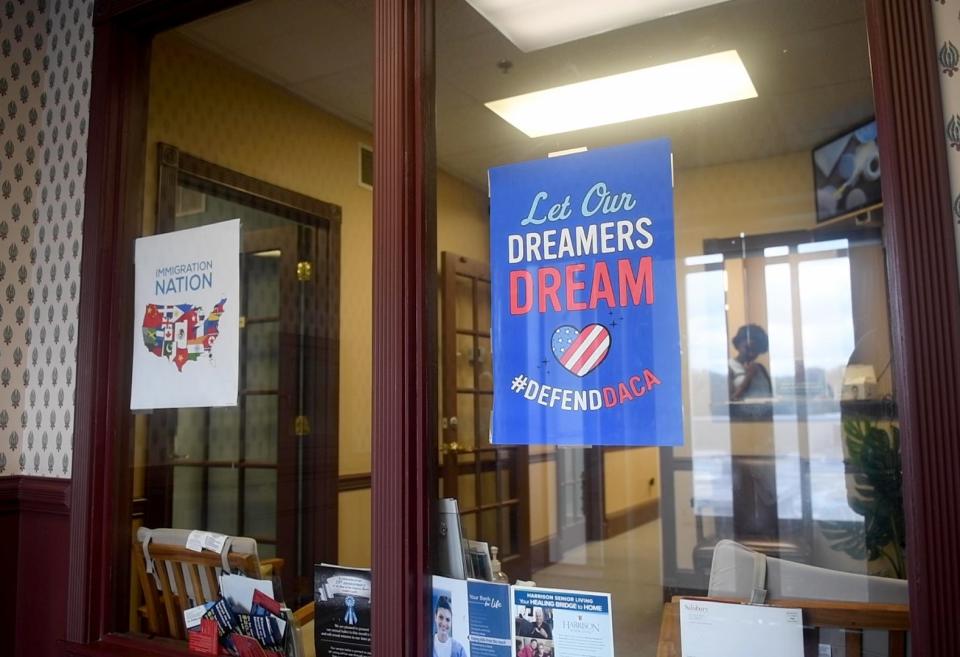Haitians on Delmarva rally to help their own through tragedies and slim options

Music pulses through the floor.
Down rows of fabric-lined chairs, it throbs in the congregants' chests, meeting their voices and eyes pinched shut. As morning light leaks from a single window peaking from its curtain, the struggles of a nation seem to charge air inside one Dover church.
The Haitian Baptist service, tucked inside HEIM Church's second floor, stretches into an October day. Some gloved hands hold prayer books, others children closer.
A visiting pastor steps to the podium.
“Everyone knows about the earthquake that happened in Haiti,” Roosevelt Toussaint says into the microphone, his words of Haitian Creole filling the small chapel fallen silent.
“It always touches my heart,” continues the senior pastor who has traveled over 50 miles north from Salisbury, Maryland. “Even if you are an American citizen, you are also Haitian. Even if you have a job in the United States, you are also Haitian. I’ve been here for a long time. My wife is American. I look like I could be American, but when I open my mouth — they know I’m not.”
The 67-year-old didn’t come to preach. Leading a newly opened development center for a bolstering Haitian population on Maryland’s Eastern Shore, he hoped to engage a community now stretched across the Delmarva peninsula.
“I’d like you to help us.”


East Coast Haitian communities, from the Eastern Shore of Maryland to southern Delaware, are organizing support for a homeland rattled by crisis, while still coping with tragedy themselves.
A pastor. A congregation. A real estate investor. An immigration outfit. Community members are helping hundreds of their own seek resources and maneuver limited immigration options.
Their homegrown efforts continue, as many in late summer watched nearly 15,000 Haitian migrants arrive at the Mexico-Texas border in search of refuge. Thousands were deported. Their efforts continue as community members watch an evacuation mission conclude in Afghanistan, fixating international attention on a U.S.-led resettlement effort they don't recognize.
Efforts continue now, as violence, kidnappings and gang activity command a homeland over 1,000 miles away — casting doubt on how resources will reach those in need, while more flee the wreckage.
In the U.S., advocate organizations continue to urge legislative change to the immigration system and Temporary Protective Status program, aiming to allow Haitian nationals more permanency.
“We don’t have a solution; we have Band-Aids for now,” said Guerline Jozef, co-founder and executive director of Haitian Bridge Alliance, speaking to limited protection available to Haitians fleeing their country. “We must do what needs to be done until we get the full protection for folks — providing response to the humanitarian supports needed right now.”
‘You know us’
The phones won't stop ringing.
Toussaint has absorbed images of sizable towns, remote villages and homes damaged or collapsed across Haiti’s southwestern peninsula. Hundreds of schools were destroyed, over 2,000 people killed, thousands more badly injured, tens of thousands left homeless after an Aug. 14 earthquake.
Long-standing political instability had already intensified following the assassination of the nation’s president, Jovenel Moïse, in July. All the upheaval came just 11 years after the disastrous earthquake of 2010.
Eyes cast down on his conference table, Toussaint remembers some members of his own peninsula community acting on desperation.
“If you know that your mom or your dad is affected by the earthquake ... sometimes you’re going to act out of instinct,” he says. “ 'If I can just be there for them. I may not be able to do much, but if I can just be there.’ “
South Jersey: Haitians, who have a strong presence in New Jersey, want to help their people back home
Maryland: Haitian business is growing on Maryland's Eastern Shore. Advocates want to keep it that way
“That's where we are hurting the most,” continues the president of the Haitian Development Center of Delmarva – the office around him officially opened in May. “We know that we would like to go over there, but because of the lack of security, we cannot.”
Fielding the daily call stream, he knows the answer in how to help would never come by impulse.
“I tell them, ‘Yes, we are,’ but we cannot really help every individual — we’ve got to do it as a whole.”
The development center partnered with Rebirth, a nonprofit committed to supporting the Haitian community on Maryland’s Lower Eastern Shore, to form a coalition. Regional leaders began meeting weekly, organizing a Delmarva Haiti’s Relief Fund, set to bring financial assistance, resources and more to Haiti this fall. The organizations have sought donations for tents, medical supplies, back-to-school supplies and more from the community they anchor.
People have heard these calls before.
“Most of the time, organizations that went over there, we don't know what they did,” Toussaint says, calling back to high-profile investigations of misused relief funds after the 2010 earthquake. “The people know us. It will be a lot easier for them to trust us with their funds, with the money in their supplies.
“Our relationship with the people will make a big difference. That difference is why we do it.”
The pastor knows much of his fellow community, like himself, still have deep family ties to Haiti.
The United States shares its own history intertwined with the Caribbean nation. It includes U.S. intervention in Haiti in 1915 to prevent Germany from taking hold, and the U.S. Marines occupied Haiti by 1934, overseeing public works, tax collection, treasury management and the development of Haiti's first professional military force.
The first democratic leadership structure formed in the country would be later followed by a string of coups. Political unrest stretched into the 1990s, and by 2021 a presidential assassination has now left a government in shambles. Natural disaster impacts from 2010 have only been met with more like it.
On Delmarva, the coalition continues to stockpile donations, aiming to coordinate travel to Haiti in the coming months. A watchful eye on security conditions in the country shows threats to their November distribution.
“There's always something. Always tragedy,” Toussaint says slowly. “If it's not earthquake, it’s a hurricane. If it's not hurricane, it is overthrowing the president. There's always something — but through it all, the Haitian has always been strong.”
Safe haven of limited options
Samson Orneus has trouble sleeping.

 Yahoo Autos
Yahoo Autos 